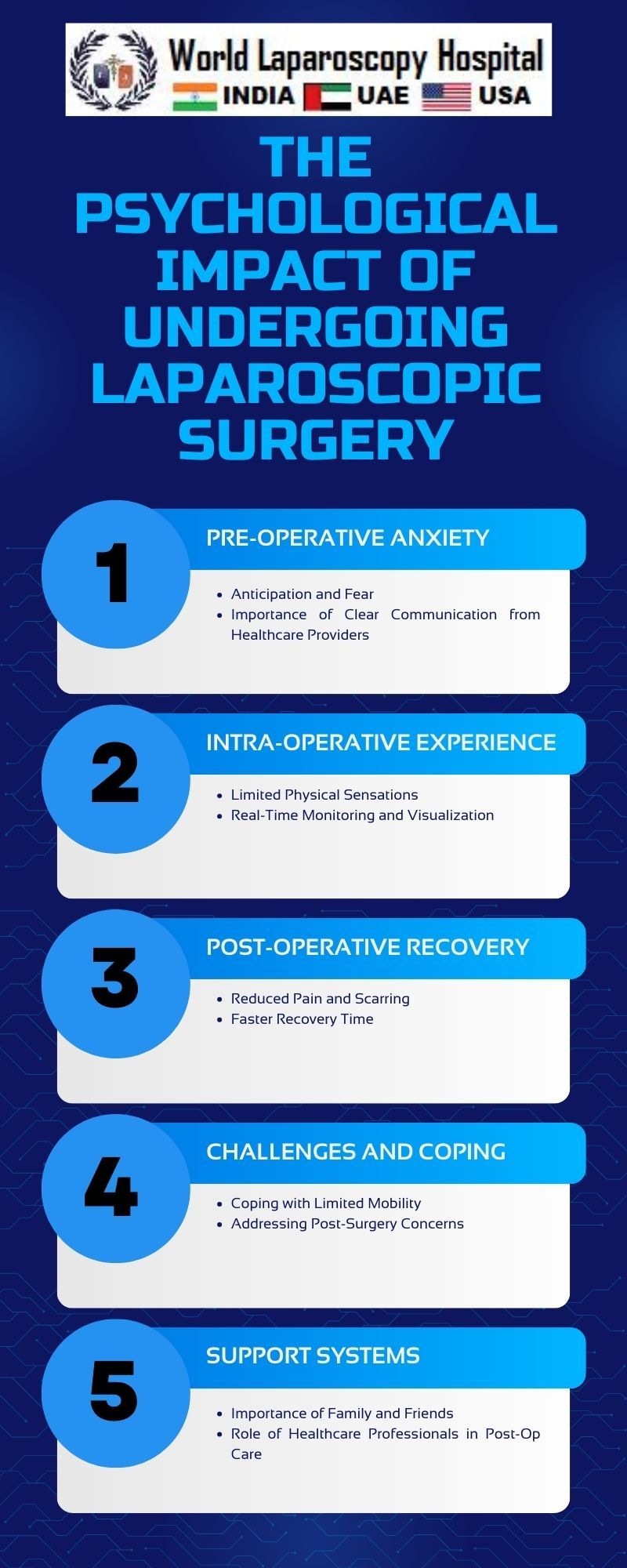The Psychological Impact of Undergoing Laparoscopic Surgery
Introduction:
Laparoscopic surgery, also known as minimally invasive surgery, has revolutionized the field of medicine by offering a less invasive alternative to traditional open surgeries. While this approach brings numerous advantages in terms of reduced pain, shorter recovery times, and smaller incisions, the psychological impact on individuals undergoing laparoscopic procedures is a multifaceted aspect that warrants exploration.

Understanding Laparoscopic Surgery:
Before delving into the psychological impact, it's crucial to comprehend the nature of laparoscopic surgery. Unlike open surgeries that involve larger incisions, laparoscopic procedures utilize small incisions through which a camera and specialized instruments are inserted. This approach minimizes trauma to surrounding tissues and organs, leading to quicker healing.
The Anxiety Anticipation:
For many patients facing laparoscopic surgery, anxiety often takes center stage. The unfamiliarity of the procedure, coupled with a natural fear of the unknown, can significantly impact a patient's mental state. Preoperative anxiety is a common phenomenon and addressing it is pivotal in ensuring a positive psychological experience for the patient.
Factors Contributing to Anxiety:
Lack of Familiarity:
Patients may feel anxious due to a lack of understanding about the laparoscopic procedure. Educating patients about the surgery, its benefits, and the expected outcomes can alleviate apprehensions.
Fear of the Unknown:
The human mind tends to conjure up worst-case scenarios when faced with uncertainty. Providing detailed information about the surgical process, potential complications, and the postoperative recovery plan helps demystify the procedure.
Concerns about Outcomes:
Patients often grapple with concerns about the success of the surgery and potential complications. Open communication between healthcare providers and patients is vital in addressing these fears and providing realistic expectations.
The Role of Preoperative Education:
To mitigate anxiety, healthcare providers play a pivotal role in offering comprehensive preoperative education. This involves explaining the entire laparoscopic process, describing the equipment used, and outlining the expected postoperative recovery. Visual aids, informational pamphlets, and one-on-one discussions with medical professionals can contribute significantly to a patient's peace of mind.
Emotional Support and the Human Connection:
Recognizing the emotional aspects of undergoing surgery, healthcare providers must prioritize emotional support. Building a strong doctor-patient relationship, where patients feel heard and understood, fosters trust and reduces anxiety. Empathy and compassion from healthcare professionals can go a long way in alleviating the psychological burden associated with laparoscopic surgery.
During the Procedure: An Unseen Battle:
While the patient is under anesthesia during laparoscopic surgery, the psychological impact continues for the healthcare professionals involved. Surgeons, despite their expertise, may experience stress and pressure, especially in delicate procedures. Managing this stress is essential to ensure optimal focus and decision-making during the surgery.
Postoperative Blues: Navigating the Road to Recovery
The psychological impact extends into the postoperative phase, where patients may experience a range of emotions as they navigate the road to recovery.
Pain Management:
Coping with postoperative pain is a significant psychological challenge. Patients need support in understanding and managing pain, both physically and emotionally. Adequate pain management strategies, including medications and non-pharmacological interventions, contribute to a smoother recovery experience.
Body Image Concerns:
The visibility of scars, though minimal in laparoscopic surgery, can still trigger body image concerns. Patients may grapple with self-esteem issues and feelings of vulnerability. Addressing these concerns through counseling and support groups can aid in the psychological healing process.
Coping with Complications:
While laparoscopic surgery is generally associated with fewer complications, unexpected issues can arise. Patients need emotional support to cope with complications and setbacks, emphasizing the importance of open communication between healthcare providers and patients.
The Role of Mental Health Professionals:
Incorporating mental health professionals into the surgical care team is becoming increasingly important. Psychologists and counselors can offer targeted support to patients before, during, and after laparoscopic surgery. By addressing anxiety, providing coping strategies, and fostering resilience, mental health professionals contribute to the overall well-being of individuals undergoing these procedures.
The Intersection of Technology and Psychology:
The integration of technology in healthcare, including laparoscopic surgery, has implications for psychological well-being. Virtual reality (VR) and augmented reality (AR) technologies, for instance, are being explored to simulate surgical experiences for patients, helping them become more familiar with the process and potentially reducing anxiety.
Conclusion:
The psychological impact of laparoscopic surgery is a multifaceted journey that begins with preoperative anxiety and extends into the postoperative recovery phase. By prioritizing preoperative education, emotional support, and the integration of mental health professionals, healthcare providers can contribute to a more positive psychological experience for patients.
As technology continues to advance, the intersection of medical and psychological care becomes increasingly important. Recognizing the human aspect of surgery and implementing holistic approaches that address both the physical and psychological dimensions is key to ensuring the well-being of individuals undergoing laparoscopic procedures.
